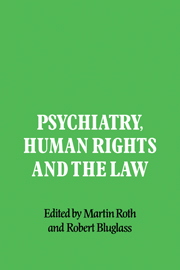Book contents
- Frontmatter
- Contents
- Editors' preface
- Contributors
- The historical background: the past 25 years since the Mental Health Act of 1959
- The social and medical consequences of recent legal reforms of mental health law in the USA: the criminalization of mental disorder
- The recent Mental Health Act in the United Kingdom: issues and perspectives
- Medical and social consequences of the Italian Psychiatric Care Act of 1978
- Lessons for the future drawn from United States legislation and experience
- Recent developments in relation to mental health and the law in the Federal Republic of Germany
- Psychopathy and dangerousness
- Dangerousness in social perspective
- Psychiatric explanations as excuses
- Detention of patients: administrative problems facing Mental Health Review Tribunals
- Developments in forensic psychiatry services in the National Health Service
- The role of psychiatry in prisons and ‘the right to punishment’
- Human rights in mental health
- Changes in mental health legislation as indicators of changing values and policies
- The Danish experience: one model of psychiatric testimony to courts of law
- A postscript on the discussions at the Cambridge Conference on Society, Psychiatry and the Law
Dangerousness in social perspective
Published online by Cambridge University Press: 04 August 2010
- Frontmatter
- Contents
- Editors' preface
- Contributors
- The historical background: the past 25 years since the Mental Health Act of 1959
- The social and medical consequences of recent legal reforms of mental health law in the USA: the criminalization of mental disorder
- The recent Mental Health Act in the United Kingdom: issues and perspectives
- Medical and social consequences of the Italian Psychiatric Care Act of 1978
- Lessons for the future drawn from United States legislation and experience
- Recent developments in relation to mental health and the law in the Federal Republic of Germany
- Psychopathy and dangerousness
- Dangerousness in social perspective
- Psychiatric explanations as excuses
- Detention of patients: administrative problems facing Mental Health Review Tribunals
- Developments in forensic psychiatry services in the National Health Service
- The role of psychiatry in prisons and ‘the right to punishment’
- Human rights in mental health
- Changes in mental health legislation as indicators of changing values and policies
- The Danish experience: one model of psychiatric testimony to courts of law
- A postscript on the discussions at the Cambridge Conference on Society, Psychiatry and the Law
Summary
Dr Alan Stone (1982) gives a list of adverse social consequences of civil libertarian and progressive reforms in American law and psychiatry. I shall not try to deal with his critique as a whole: of his ‘bill of particulars’ I shall attend only to the question of protecting the public. The concept of dangerousness is the villain of his piece and I shall consider it in social perspective by offering some observations on the notion of protecting the public and on the suitability of clinical assessments of dangerousness as instruments of public policy.
There is today a tension at the heart of public policy: protecting the public indirectly from the risk of grave harm at the hands of mental patients and serious offenders, by hospitalising and imprisoning them for long periods, frequently exposes those sentenced to the risk of unnecessary detention – unnecessary, that is, for the avowed purposes of treatment or punishment. Wherever the movement to block this source of injustice has been successful, the authorities have thought it necessary to make special arrangements to identify and detain a minority believed to be dangerous. But the practice of detaining people on a presumption of dangerousness carries its own risk of infringing the rights of mental patients and serious offenders; for a high degree of uncertainty is inherent in predictive judgments of conduct, and preventive measures taken on the basis of such judgments impose on those to whom they are applied a correspondingly high risk of being detained unnecessarily. The practice therefore comes under attack from reformers, who say it should be abandoned.
- Type
- Chapter
- Information
- Psychiatry, Human Rights and the Law , pp. 81 - 95Publisher: Cambridge University PressPrint publication year: 1985
- 2
- Cited by

